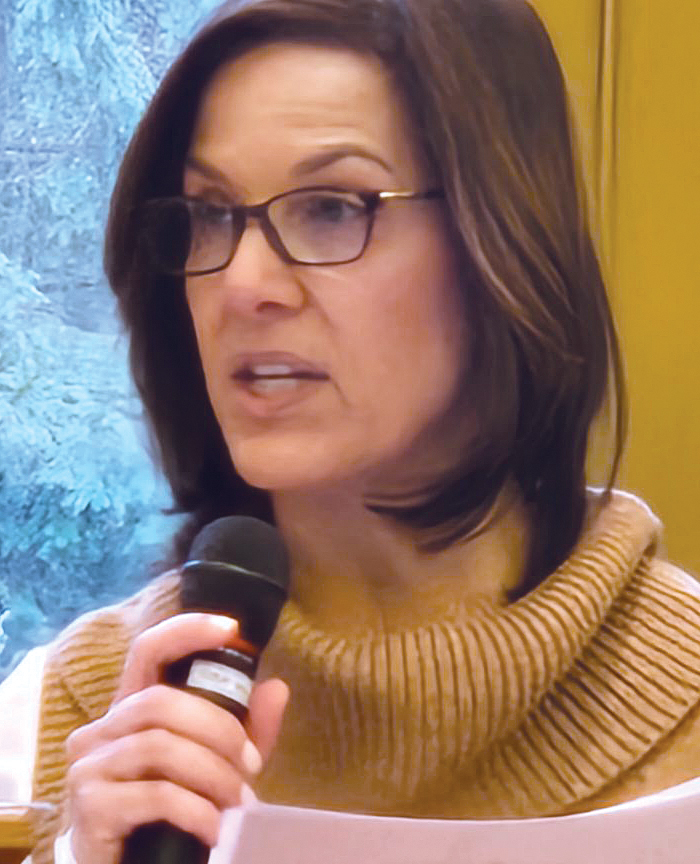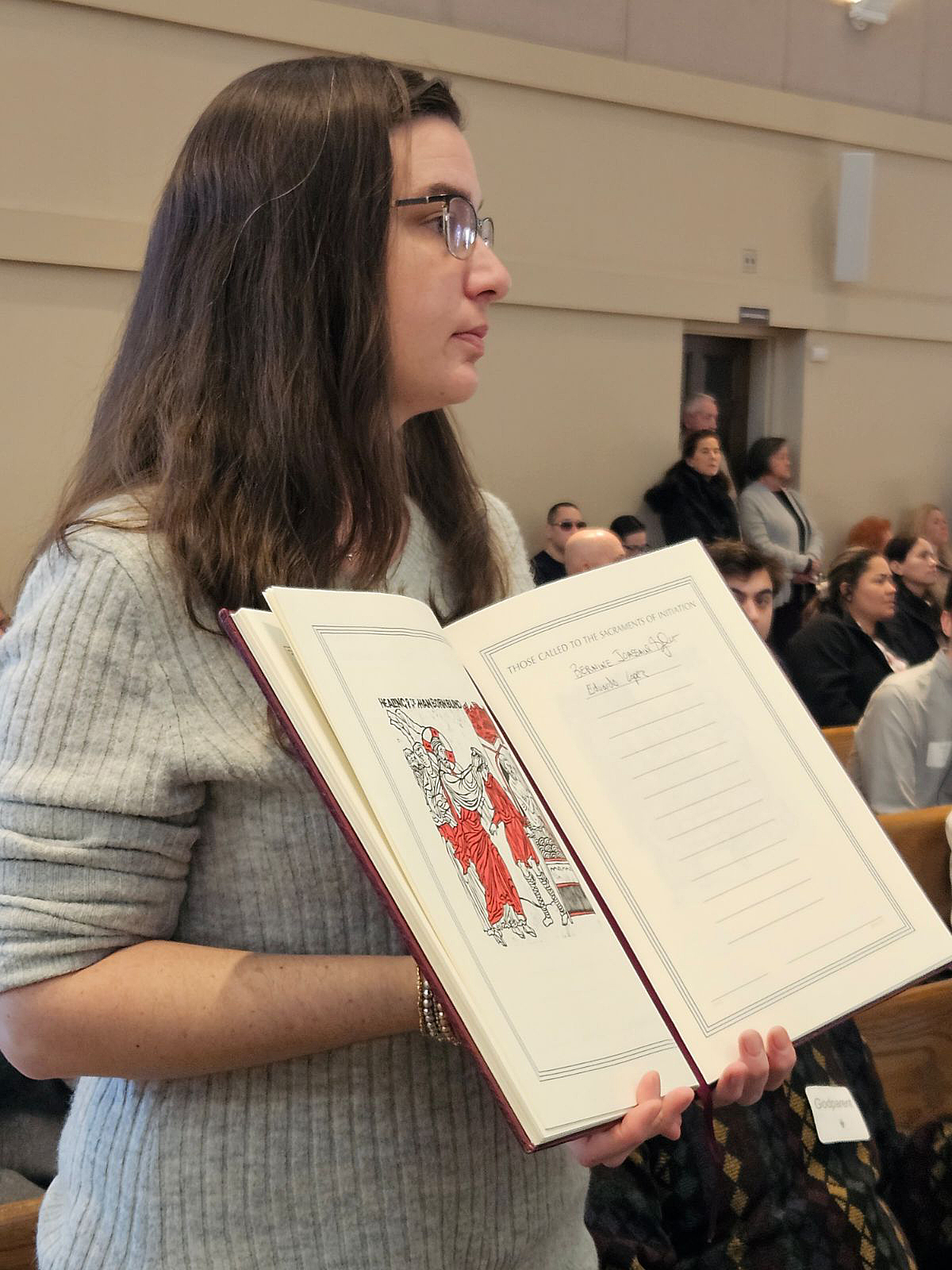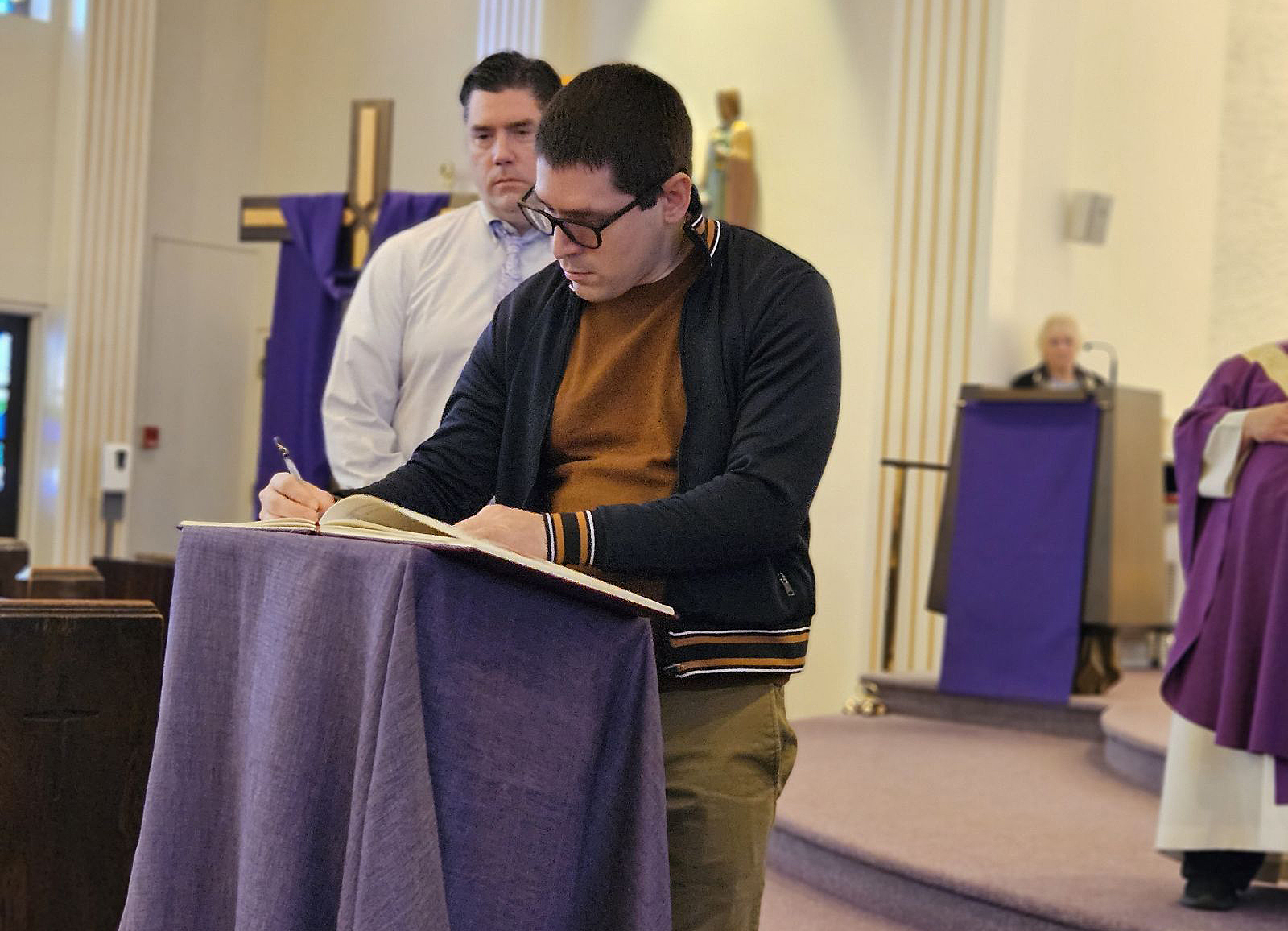Understanding the RCIA and our role in it
March 12, 2024 at 10:56 a.m.

 Denise ContinoDenise Contino, diocesan director of the Department of Catechesis, sat down for a Q and A with The Monitor Magazine about the journey taken by those who wish to become Catholic and how each parish is impacted through their involvement in this process.
Denise ContinoDenise Contino, diocesan director of the Department of Catechesis, sat down for a Q and A with The Monitor Magazine about the journey taken by those who wish to become Catholic and how each parish is impacted through their involvement in this process.
Q. How would you describe the RCIA ministry and the impact it has on the Church today?
A. The Rite of Christian Initiation of Adults (RCIA) is a gradual process that takes place within the community of the faithful and is designed to welcome individuals seeking to become members of the Catholic Church. RCIA is for the unbaptized or someone who has been baptized as a Catholic or another Christian tradition and is seeking full initiation in the Church. The process offers the seeker a place to discover Jesus Christ, the teachings of the Church, a place in the parish community, and a pathway to becoming fully initiated in the Catholic Church.
The process has four periods that continue beyond the reception of the Sacraments.
1. Evangelization and Pre-Catechumenate is a time for the unbaptized to uncover their curiosity about Jesus Christ.
2. The Period of the Catechumenate is for formal teaching, study of the Scriptures, learning to pray, and to be introduced and immersed into the life of the parish community.
3. Purification and Enlightenment is a period for spiritual preparation that takes place during the Lenten season to purify their minds and hearts and to prepare them for the celebration of the Sacraments at the Easter Vigil (Baptism, Confirmation and First Eucharist).
4. Mystagogy is a time for the newly baptized to deepen their faith and uncover the experience of the Sacraments.
This ministry is a doorway for anyone who desires to become Catholic and to become fully initiated. This ministry is a place for the Church to practice evangelization and welcome those who want to encounter Jesus.

RCIA team members, like Stevie Quinn from Corpus Christi Parish, Willingboro, have an integral role in walking with persons seeking to enter the Catholic faith. Mary Stadnyk photo
Q. Among those who have gone through RCIA, what are some of the most common reasons cited for their decision to become Catholic?
A. There are so many reasons that people inquire about the Catholic Church and their desire to become Catholic. Normally, we hear about a turning point in someone’s life that brings them into the process, but ultimately it is their curiosity and innate desire to be in relationship with God that brings them to RCIA. Many times, we hear that they know someone who is Catholic and desire to have what they have, are marrying a Catholic or being asked to be a godparent; no matter the reason, after they are supported by the parish community through the process, they are changed. They have turned their life toward God, they now have a prayer life, are involved in service and are engaged in the community of the parish.
Q. How many people serve in RCIA ministry across the Diocese, and what reasons do they give for their commitment to this ministry?
A. We have more than 350 RCIA team members and leaders in our parishes. This process does not have a required time for a seeker to go through the process. It takes as long as is needed; the rite calls for the catechumenate period to be 1-3 years. Each person may have a different journey.
I have heard from many team members that they truly enjoy walking with the person seeking the Sacraments. Their own faith deepens throughout the process of passing on the faith.
Q. What does a parish community gain through witnessing and standing with the adults and young people in their communities on their journey toward full membership in the Church? What inspiration does their journey offer to all?
A. The parish community’s faith is deepened by the process, especially the experience of the various rites that are celebrated. For example, the Rite of Acceptance takes place when a seeker is about to be accepted into the Order of Catechumens. During the Rite of Acceptance, the community witnesses the signing of the senses, usually carried out by the sponsor or catechist at Mass. For example, when the lips are being signed with the cross, the priest says, “Receive the Sign of the Cross on your lips, that you may respond to the word of God.” By experiencing this, community members are challenged and provided with a way to deepen their own faith.
Q. What are some practical ways that every Catholic can try to invite those of another faith, or no faith, to consider the Catholic Church?
A. Here are few tips:
• Be joyful; if others see your joy, they will want what you have.
• Be bold in sharing your faith stories with people, especially the impact that being Catholic has in your life.
• Invite someone to attend a parish event with you so they can see the living joy in the community.
• If you know someone who seems interested in your faith, be bold and ask them to attend Mass with you.
• Personally invite someone to consider becoming Catholic.

Eduardo Lopez signs the Book of the Elect during the Rite of Sending ceremony held in Corpus Christi Church, Willingboro. Looking on is Lopez’s godparent, Matt Laughland. Mary Stadnyk photo
With love and support, parishes send their catechumens to Rite of Election
As nearly 250 catechumens from around the Diocese prepared to head to St. Robert Bellarmine Co-Cathedral, Freehold, Feb. 18 for the Rite of Election, some were given a special sendoff by their parish communities.
Catechumens are unbaptized persons who are preparing for full initiation into the Catholic Church through the Sacraments of Baptism, Confirmation and Eucharist.
The Rite of Sending, which occurs annually near or on the first Sunday of Lent, is when the catechumens are first recognized by their pastor and fellow parishioners. During Sunday Mass, the catechumens are prayed for, blessed and sent forth by the parish community to the Rite of Election. As part of the Rite of Sending, the catechumens sign the Book of the Elect, a formal record of the names of those from the parish who are preparing for Baptism. The Book of the Elect is later carried to the Co-Cathedral for presentation at the Rite of Election.
When the catechumens gathered for the Rite of Election, Bishop David M. O’Connell, C.M., formally acknowledged their readiness and called them to receive the Sacraments at the Easter Vigil. Once accepted by the Bishop, the catechumens are publicly declared as “the elect.”
Parishes can choose when to celebrate Rite of Sending ceremonies. Some parishes, like St. Anthony of Padua, Hightstown, held the ceremony a week or two prior to Rite of Election, while others, such as St. Pius X, Forked River, and Corpus Christi, Willingboro, held the ceremony the morning of the Rite of Election.
Related Stories
Friday, July 26, 2024
E-Editions
Events
 Denise ContinoDenise Contino, diocesan director of the Department of Catechesis, sat down for a Q and A with The Monitor Magazine about the journey taken by those who wish to become Catholic and how each parish is impacted through their involvement in this process.
Denise ContinoDenise Contino, diocesan director of the Department of Catechesis, sat down for a Q and A with The Monitor Magazine about the journey taken by those who wish to become Catholic and how each parish is impacted through their involvement in this process.
Q. How would you describe the RCIA ministry and the impact it has on the Church today?
A. The Rite of Christian Initiation of Adults (RCIA) is a gradual process that takes place within the community of the faithful and is designed to welcome individuals seeking to become members of the Catholic Church. RCIA is for the unbaptized or someone who has been baptized as a Catholic or another Christian tradition and is seeking full initiation in the Church. The process offers the seeker a place to discover Jesus Christ, the teachings of the Church, a place in the parish community, and a pathway to becoming fully initiated in the Catholic Church.
The process has four periods that continue beyond the reception of the Sacraments.
1. Evangelization and Pre-Catechumenate is a time for the unbaptized to uncover their curiosity about Jesus Christ.
2. The Period of the Catechumenate is for formal teaching, study of the Scriptures, learning to pray, and to be introduced and immersed into the life of the parish community.
3. Purification and Enlightenment is a period for spiritual preparation that takes place during the Lenten season to purify their minds and hearts and to prepare them for the celebration of the Sacraments at the Easter Vigil (Baptism, Confirmation and First Eucharist).
4. Mystagogy is a time for the newly baptized to deepen their faith and uncover the experience of the Sacraments.
This ministry is a doorway for anyone who desires to become Catholic and to become fully initiated. This ministry is a place for the Church to practice evangelization and welcome those who want to encounter Jesus.

RCIA team members, like Stevie Quinn from Corpus Christi Parish, Willingboro, have an integral role in walking with persons seeking to enter the Catholic faith. Mary Stadnyk photo
Q. Among those who have gone through RCIA, what are some of the most common reasons cited for their decision to become Catholic?
A. There are so many reasons that people inquire about the Catholic Church and their desire to become Catholic. Normally, we hear about a turning point in someone’s life that brings them into the process, but ultimately it is their curiosity and innate desire to be in relationship with God that brings them to RCIA. Many times, we hear that they know someone who is Catholic and desire to have what they have, are marrying a Catholic or being asked to be a godparent; no matter the reason, after they are supported by the parish community through the process, they are changed. They have turned their life toward God, they now have a prayer life, are involved in service and are engaged in the community of the parish.
Q. How many people serve in RCIA ministry across the Diocese, and what reasons do they give for their commitment to this ministry?
A. We have more than 350 RCIA team members and leaders in our parishes. This process does not have a required time for a seeker to go through the process. It takes as long as is needed; the rite calls for the catechumenate period to be 1-3 years. Each person may have a different journey.
I have heard from many team members that they truly enjoy walking with the person seeking the Sacraments. Their own faith deepens throughout the process of passing on the faith.
Q. What does a parish community gain through witnessing and standing with the adults and young people in their communities on their journey toward full membership in the Church? What inspiration does their journey offer to all?
A. The parish community’s faith is deepened by the process, especially the experience of the various rites that are celebrated. For example, the Rite of Acceptance takes place when a seeker is about to be accepted into the Order of Catechumens. During the Rite of Acceptance, the community witnesses the signing of the senses, usually carried out by the sponsor or catechist at Mass. For example, when the lips are being signed with the cross, the priest says, “Receive the Sign of the Cross on your lips, that you may respond to the word of God.” By experiencing this, community members are challenged and provided with a way to deepen their own faith.
Q. What are some practical ways that every Catholic can try to invite those of another faith, or no faith, to consider the Catholic Church?
A. Here are few tips:
• Be joyful; if others see your joy, they will want what you have.
• Be bold in sharing your faith stories with people, especially the impact that being Catholic has in your life.
• Invite someone to attend a parish event with you so they can see the living joy in the community.
• If you know someone who seems interested in your faith, be bold and ask them to attend Mass with you.
• Personally invite someone to consider becoming Catholic.

Eduardo Lopez signs the Book of the Elect during the Rite of Sending ceremony held in Corpus Christi Church, Willingboro. Looking on is Lopez’s godparent, Matt Laughland. Mary Stadnyk photo
With love and support, parishes send their catechumens to Rite of Election
As nearly 250 catechumens from around the Diocese prepared to head to St. Robert Bellarmine Co-Cathedral, Freehold, Feb. 18 for the Rite of Election, some were given a special sendoff by their parish communities.
Catechumens are unbaptized persons who are preparing for full initiation into the Catholic Church through the Sacraments of Baptism, Confirmation and Eucharist.
The Rite of Sending, which occurs annually near or on the first Sunday of Lent, is when the catechumens are first recognized by their pastor and fellow parishioners. During Sunday Mass, the catechumens are prayed for, blessed and sent forth by the parish community to the Rite of Election. As part of the Rite of Sending, the catechumens sign the Book of the Elect, a formal record of the names of those from the parish who are preparing for Baptism. The Book of the Elect is later carried to the Co-Cathedral for presentation at the Rite of Election.
When the catechumens gathered for the Rite of Election, Bishop David M. O’Connell, C.M., formally acknowledged their readiness and called them to receive the Sacraments at the Easter Vigil. Once accepted by the Bishop, the catechumens are publicly declared as “the elect.”
Parishes can choose when to celebrate Rite of Sending ceremonies. Some parishes, like St. Anthony of Padua, Hightstown, held the ceremony a week or two prior to Rite of Election, while others, such as St. Pius X, Forked River, and Corpus Christi, Willingboro, held the ceremony the morning of the Rite of Election.










